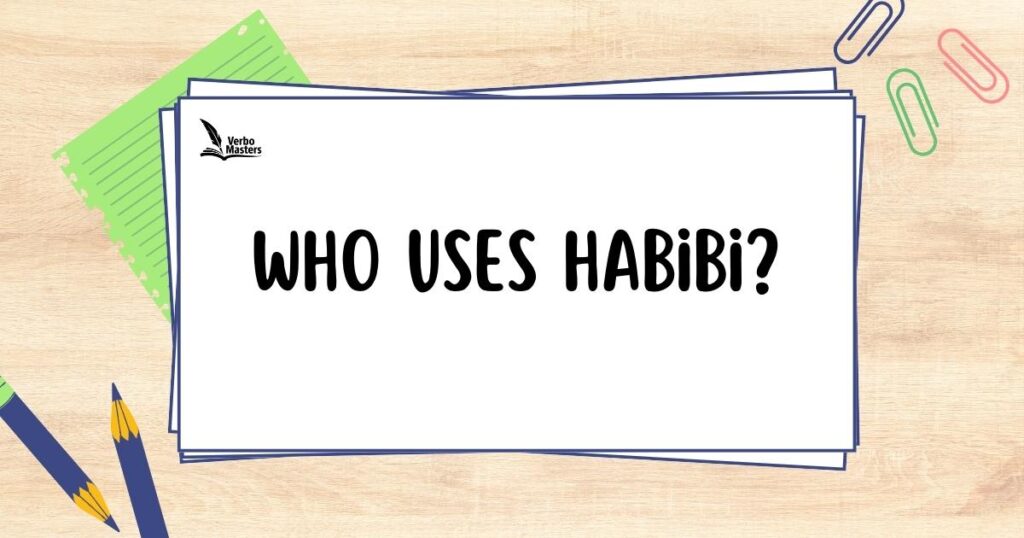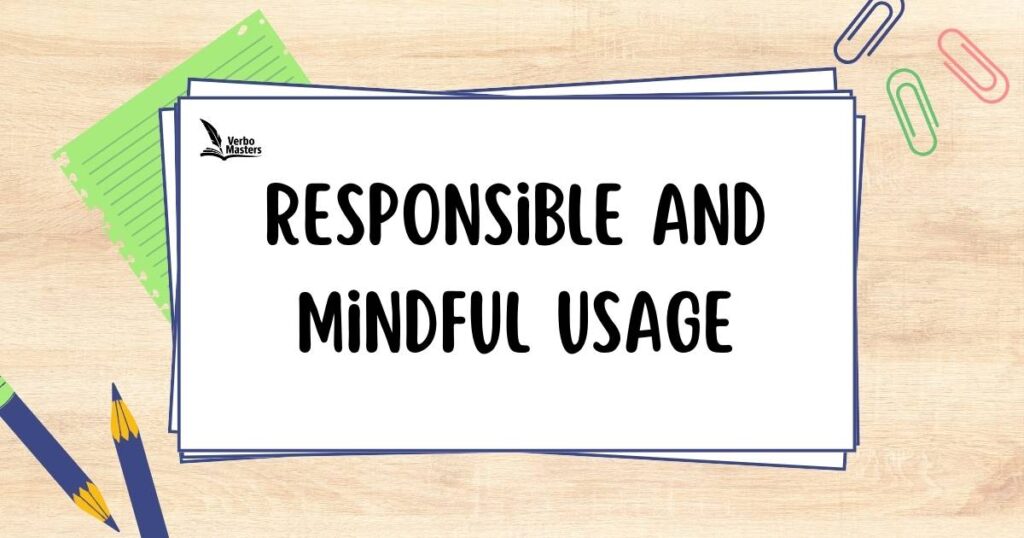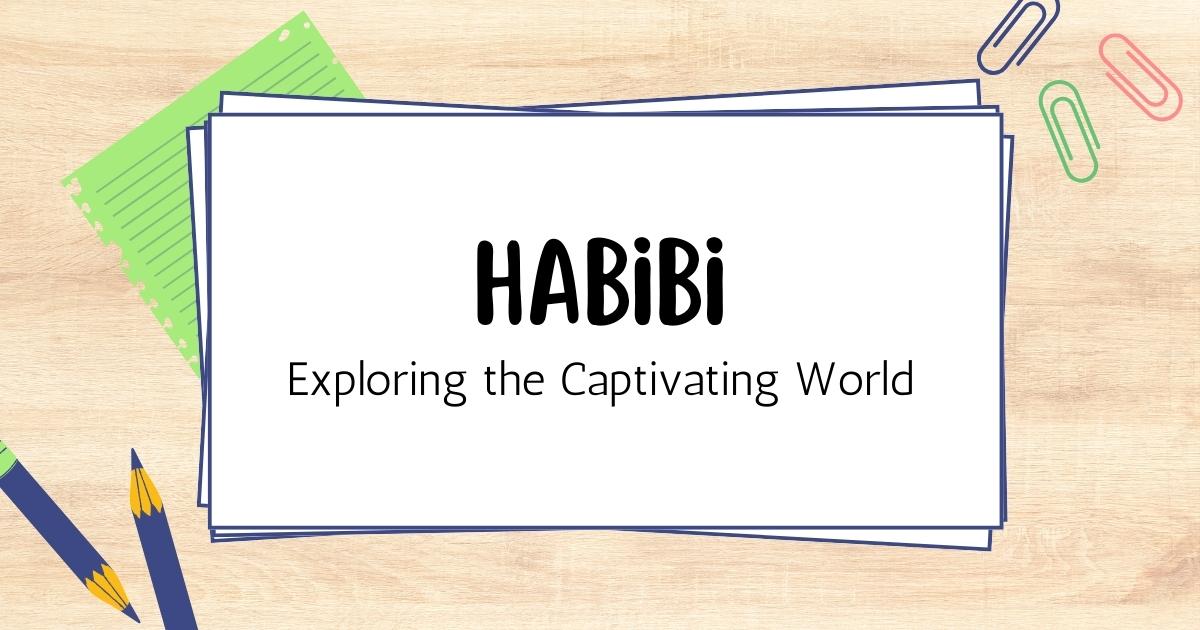The word Habibi is more than just a term—it’s filled with warmth and affection. It comes from Arabic and means “my love” or “my dear.” You’ve probably heard it in songs, movies, or on social media.
People use it casually with friends, family, or someone special. It sounds sweet and instantly creates a bond. Both men and women use the word, though it slightly changes to Habibti for females.
It’s common across many Arabic-speaking countries and cultures. Over time, the word has crossed borders and become a global expression of endearment. Whether it’s romantic or friendly, “Habibi” adds charm to any conversation.
Unraveling the Meaning of Habibi
The word Habibi is one of the most commonly used Arabic terms of endearment. It literally translates to “my beloved” or “my dear,” and it carries warmth, care, and affection. Whether used between lovers, friends, or family, it brings a special charm to everyday conversations.
Here are 25 simple and helpful points that explain the meaning and use of Habibi:
1. Habibi means “my love” or “my dear” in Arabic.
2. It is commonly used in Arabic-speaking countries.
3. The word comes from the root ḥ-b-b, which means “love.”
4. It’s used to express affection in both casual and deep ways.
5. “Habibi” is used for males; “Habibti” is the female version.
6. It’s often heard in Arabic songs and pop culture.
7. The term goes beyond romantic love—it’s for family and friends too.
8. Saying “Habibi” can show warmth and friendliness.
9. It’s often used like “dear” or “sweetheart” in English.
10. Even non-Arabic speakers love to use the word because of its vibe.
11. In Arab culture, using Habibi is very normal in daily speech.
12. You’ll hear it in music, especially in love songs.
13. It’s a soft and sweet word that feels comforting.
14. It can be said jokingly or seriously, depending on the tone.
15. Many artists worldwide use it in lyrics and social media.
16. The word makes conversations feel more personal.
17. It’s often said during greetings and goodbyes.
18. In some cultures, it’s used like “buddy” or “pal.”
19. Saying “Yalla, Habibi” means “Come on, my dear.”
20. You can say it to a child, friend, or partner.
21. It’s a great way to soften any message or mood.
22. People enjoy using it because it sounds joyful.
23. It can make someone feel appreciated and cared for.
24. The word is recognized globally now, even outside the Middle East.
25. “Habibi” is more than a word—it’s a feeling of closeness.
Embracing Habibi in Conversation
Using “Habibi” in everyday talk adds warmth and charm. It’s a simple way to show affection or friendliness, whether you’re texting, greeting, or joking around. Let’s explore how this word fits naturally into real conversations.
1. Say “Hi, Habibi” to greet someone with love.
2. Use it in texts to sound sweet or playful.
3. “Good morning, Habibi” makes any day brighter.
4. It helps break the ice in casual chats.
5. Friends use it to tease each other gently.
6. Couples use it like “babe” or “sweetheart.”
7. You can use it with kids to sound caring.
8. It’s nice to say it before saying goodbye.
9. “What’s up, Habibi?” sounds cool and casual.
10. It fits well in voice notes for a friendly tone.
11. Say it with a smile, and it works like magic.
12. You can use it even when you’re annoyed, to stay kind.
13. It softens serious talk, keeping things warm.
14. It’s good for cheering someone up.
15. Use it after someone helps you—“Thanks, Habibi!”
16. It makes jokes feel more personal.
17. Use it when complimenting someone’s look or style.
18. It works great in romantic texts or notes.
19. Say it to calm someone down in tense moments.
20. It helps maintain closeness in long-distance friendships.
21. Use it in video calls to feel more connected.
22. In business, use it lightly—only if it feels right.
23. Say it during celebrations to add joy.
24. It fits well in music lyrics or captions.
25. No matter how you use it, it brings people closer.
You can also read; 50 Synonyms & Antonyms for Hard: Your Complete Guide to Using This Tricky Word
The Cultural Significance
In Arab culture, Habibi is more than a word—it reflects the value placed on love, family, and friendship. It’s deeply woven into everyday life and communication. The word carries emotional meaning, rooted in warmth and social connection.
1. “Habibi” reflects love and care in Arabic culture.
2. It’s used often in family settings.
3. Friends call each other Habibi to stay close.
4. It’s spoken during kind or loving moments.
5. The word shows respect and fondness.
6. It helps build strong community bonds.
7. Arab songs use “Habibi” to express passion.
8. The term often appears in poetry and art.
9. It plays a key role in cultural storytelling.
10. It’s taught to kids as a kind way to speak.
11. Elders use it when comforting the young.
12. It symbolizes unity and human connection.
13. You’ll hear it in weddings and happy gatherings.
14. It’s part of traditional greetings in many homes.
15. Habibi brings out a warm, soft side in people.
16. The word helps maintain politeness in conversations.
17. It’s used widely across many Arab countries.
18. Even in serious talks, it adds a human touch.
19. It reflects the Arab love for expressive language.
20. Using “Habibi” shows emotional openness.
21. It can express care, even during sad times.
22. It’s also used humorously to lighten the mood.
23. “Habibi” helps keep cultural values alive.
24. It strengthens the feeling of belonging.
Synonyms and Alternative Words
Sometimes you might want to switch it up instead of saying “Habibi” all the time. There are many other sweet and affectionate words used in different cultures and languages. Here are some cozy, fun, and loving alternatives you can use.
1. Darling – A classic English term for someone dear.
2. Sweetheart – Often used in relationships or family.
3. Babe – A casual, modern favorite for couples.
4. Love – Popular in British English, super warm.
5. Honey – Cute and friendly, even used with kids.
6. Dear – Kind and polite, especially in letters.
7. Angel – Perfect for someone gentle or helpful.
8. Cutie – Playful and flirty.
9. Snugglebug – Silly and sweet for close moments.
10. Pumpkin – Light-hearted and full of charm.
11. Mi amor – Spanish for “my love.”
12. Mon chéri – French for “my dear.”
13. Amore – Italian for love or darling.
14. Sweetie pie – Playful, warm, and childlike.
15. Lover – More romantic, used in deep relationships.
16. Boo – Trendy and fun in modern slang.
17. Snookums – Silly, old-fashioned but loving.
18. Sunshine – Great for someone who brightens your day.
19. Treasure – Shows someone is truly valued.
20. Sweets – Short, simple, and sugary.
21. Cupcake – A fun twist with sweetness.
22. Babycakes – Flirty and full of fun.
23. Pookie – Cutesy nickname for close bonds.
24. My heart – Deep and poetic way to say you care.
25. My world – Shows how much they mean to you.
Antonyms
While “Habibi” is all about love and affection, there are some words that show the opposite. These antonyms are cold, distant, or even unfriendly—but still useful to know for contrast or caution. Let’s look at words that don’t carry the warmth of “Habibi.”
1. Stranger – Someone you don’t know or feel close to.
2. Enemy – The total opposite of a loved one.
3. Foe – A formal or old-fashioned word for enemy.
4. Rival – Someone you’re competing against.
5. Opponent – A person on the opposite side.
6. Hater – Someone who shows dislike or jealousy.
7. Nemesis – A long-time rival or enemy.
8. Outsider – Not part of your group or circle.
9. Stranger – No emotional connection.
10. Cold-hearted – Lacks care or compassion.
11. Cruel – Someone who hurts others on purpose.
12. Unfriendly – Lacks warmth or kindness.
13. Harsh – Sharp, mean, or insensitive.
14. Indifferent – Doesn’t show feelings either way.
15. Grumpy – Often annoyed or bad-tempered.
16. Mean – Someone who treats others badly.
17. Hostile – Unwelcoming and aggressive.
18. Rude – Lacks manners and kindness.
19. Aloof – Distant and uncaring.
20. Snobbish – Acts superior and cold.
21. Uncaring – Doesn’t show concern for others.
22. Jealous – Resentful, not loving.
23. Distant – Emotionally far away.
24. Bitter – Carries negative feelings.
25. Toxic – Harmful to be around.
Who Uses Habibi?

“Habibi” is used by many people in the Arab world and beyond. It’s not just for lovers—it’s also for friends, family, and even in casual conversations. Let’s look at who commonly uses this warm, affectionate word.
1. Couples – Romantic partners say it to show love.
2. Parents – Moms and dads use it with kids.
3. Friends – It’s friendly and full of care.
4. Grandparents – They say it with extra warmth.
5. Singers – Many songs use it in lyrics.
6. Actors – You’ll hear it in TV shows and movies.
7. Influencers – Popular in videos and social media.
8. Teachers – Sometimes used in kind, soft tones.
9. Strangers – Occasionally used casually in public.
10. Shopkeepers – To greet customers kindly.
11. Taxi drivers – In friendly exchanges.
12. Baristas or servers – To create a welcoming vibe.
13. Doctors or nurses – To calm or comfort a patient.
14. Tour guides – To make tourists feel at home.
15. Comedians – For laughs and charm.
16. Street vendors – Common in local markets.
17. Online gamers – Used in chat for fun.
18. Poets – It adds emotional value.
19. Writers – Makes stories feel warm.
20. Radio hosts – Sounds sweet on air.
21. Podcast hosts – Brings a personal touch.
22. Dancers – Especially in Middle Eastern music.
23. Event hosts – To hype up a crowd lovingly.
24. People in relationships – Shows strong connection.
25. Language learners – Love using it for practice.
When to Use Habibi in Conversation
Using “Habibi” can brighten someone’s day, but knowing when to use it makes all the difference. It’s all about love, care, or kindness—but timing matters. Here’s when it fits perfectly in real conversations.
1. Saying hello – “Hey, Habibi!” is warm and friendly.
2. Saying goodbye – Adds a soft tone when parting.
3. Showing love – Tells someone they matter.
4. Giving comfort – Great in calming moments.
5. Thanking someone – Adds extra gratitude.
6. Flirting – It’s romantic but sweet.
7. Cheering someone up – Shows support with love.
8. Sending texts – Cute in messages or DMs.
9. Waking someone up – “Good morning, Habibi!”
10. Celebrating – Say it at parties or birthdays.
11. Complimenting – Mix it with a sweet line.
12. Joking around – Adds fun and charm.
13. Apologizing – Helps soften the mood.
14. Writing cards – Beautiful in personal notes.
15. Making a toast – Uplifts the energy.
16. Comforting someone sick – Like a warm hug in words.
17. Ending a call – “Bye, Habibi” feels caring.
18. In lullabies – Soft and peaceful for kids.
19. Saying sorry – Adds genuine feeling.
20. During prayer or blessings – Gentle and kind.
21. Encouraging someone – Builds confidence.
22. Writing poems – Adds cultural flair.
23. In romantic songs – Full of feeling.
24. Telling stories – Makes them more emotional.
25. On special occasions – Extra love during holidays.
Responsible and Mindful Usage

“Habibi” is a beautiful word, but like all words, it should be used with care. It carries emotional weight and cultural meaning. Here’s how to use it thoughtfully and respectfully.
1. Respect the culture – Understand where it comes from.
2. Avoid overusing – Don’t say it in every sentence.
3. Know your audience – Not everyone is comfortable with it.
4. Don’t use it sarcastically – That can come off as rude.
5. Avoid mocking accents – Say it with genuine respect.
6. Be sincere – Mean it when you say it.
7. Use it with people you know – Especially in close relationships.
8. Listen to context – Not every moment calls for it.
9. Don’t use it in formal settings – It’s casual and affectionate.
10. Avoid using it to flirt with strangers – It might feel too personal.
11. Ask if it’s okay – Especially in new conversations.
12. Don’t assume everyone likes it – Respect personal boundaries.
13. Stay humble about using it – It’s not a badge of honor.
14. Use it as a bridge, not a joke – It’s not for laughs.
15. Keep it light-hearted – It should bring warmth, not awkwardness.
16. Don’t turn it into slang – It already has meaning.
17. Appreciate, don’t appropriate – Show love, not ownership.
18. Avoid saying it in mock fights – That sends mixed signals.
19. Let locals guide you – Learn from native speakers.
20. Practice correct pronunciation – Show you care.
21. Don’t combine it with curse words – That ruins its charm.
22. Be aware of tone – It should always sound kind.
23. Keep it positive – It’s a word for affection, not anger.
24. Be open to correction – Learning is part of respect.
25. Use it with love – That’s its true purpose.
FAQs
What does “Habibi” mean?
“Habibi” is an Arabic word that means “my love” or “my dear.” It’s often used to show affection to someone close, like a friend, partner, or family member.
Is “Habibi” used for both men and women?
Not exactly. “Habibi” is typically used when addressing a male. For females, the word changes slightly to “Habibti.”
Can non-Arabic speakers use the word “Habibi”?
Yes, but it’s important to use it respectfully. If you’re using it casually or affectionately with someone who understands the word, it’s usually okay.
Is “Habibi” only used romantically?
No, it’s not just for romance. It can also be used between close friends or family members as a warm, friendly term.
How do you pronounce “Habibi”?
It’s pronounced ha-BEE-bee, with the stress on the second syllable. It’s smooth and soft, just like its meaning.
Is it okay to say “Habibi” to strangers?
It depends on the context. It’s usually best used with people you know or when the tone is light and friendly.
What’s the difference between “Habibi” and “Habibti”?
“Habibi” is for males, while “Habibti” is for females. The endings change based on the gender of the person you’re speaking to.
Is “Habibi” used in Arabic songs and pop culture?
Yes, very often! You’ll hear it in love songs, movies, and even casual conversation. It adds emotion and charm.
Are there any English words similar to “Habibi”?
Words like “darling,” “sweetheart,” or “dear” are similar in meaning and tone, though each has its own cultural flavor.
Why is “Habibi” so popular outside Arabic-speaking countries?
The word has a beautiful sound and a loving meaning. It’s catchy, emotional, and fun to say, which is why it’s caught on around the world.
Conclusion
The word Habibi is more than just a term of affection—it’s a symbol of warmth, love, and cultural richness. It brings people closer, whether in songs, chats, or everyday moments. Its soft sound and sweet meaning make it truly unforgettable.Using Habibi the right way shows not only affection but also respect for the culture it comes from. It’s a simple word, yet full of heart and history. With care and sincerity, it becomes a beautiful bridge between people.

I’m John Smith, a language enthusiast dedicated to helping writers, students, and professionals master the art of clear and effective communication. Whether you’re looking for grammar tips, writing guides, or common mistake corrections, you’ll find valuable insights to improve your language skills. Let’s make grammar simple and fun!

